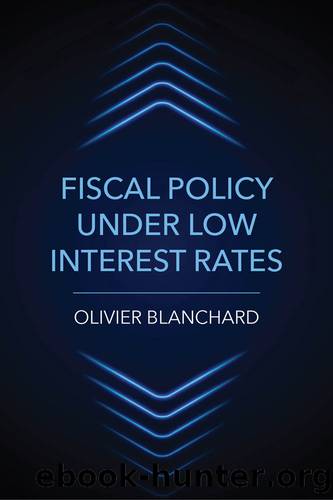Fiscal Policy under Low Interest Rates by Olivier Blanchard

Author:Olivier Blanchard
Language: eng
Format: epub
Publisher: The MIT Press
Should Central Banks Write Off Their Holdings of Government Bonds?
As debt levels have increased, some have argued that central banks should simply write off their holdings of government bonds to give governments more fiscal space.39 I have argued earlier that there was a lot of remaining fiscal space, so there was no need for any kind of write-off at this point; but leaving this argument aside, this particular type of write-off would not achieve what its proponents believe.
The proposition is that the cancellation of the bonds held by the central bank would decrease the amount of interest payments and thus the debt service of governments. And indeed, it would. But it would have another effectânamely, to decrease the revenues of the central bank and thus the profits that the central bank turns in to the government. This second effect would be exactly of the same size as the first, and the net effect on the government budget constraint would be equal to zero.
Another way of stating the same conclusion is to look at the operation from the viewpoint of private investors. From their viewpoint, this is just an exchange of claims between the government and the central bank. The central bank gives up claims on the government; the government gives up claims on central bank profits. This has no implication for private investors. (Some proponents have argued that the decrease in the reported official debt of the central governmentâwhich indeed would happenâwould lead investors and rating agencies to see this as an improvement and thus increase fiscal space. This is assuming too much stupidity on the part of investors.)
While the write-off has no direct effects, it is likely to have adverse political effects. As a signal, it may lead investors to question the central bankâs independence. And given the size of most central bank balance sheets, the cancellation of claims on the government is likely to lead to a negative balance sheet for the central bank. As I discussed earlier, while this is of no economic relevance, it may make it more difficult for the central bank to keep its independence vis-Ã -vis the government, leading to a higher probability of fiscal dominance. It is to be avoided.
A final remark about the ECB (as this is the context in which the French discussion has taken place). Because the ECB is not a national bank, cancellation of government bonds of one member country would indeed improve the fiscal situation of that country. The reason is that, given that ECB profits are distributed among all member countries (in proportion to their capital key), the decrease in profits for the country whose debt is written off will be much smaller than the decrease in its debt. In effect, the cancellation will lead to a transfer from all member countries to the country in question. This shows, however, the limits of the argument: It is very unlikely that other members will agree to it. And if the debt is canceled in the same proportion for
Download
This site does not store any files on its server. We only index and link to content provided by other sites. Please contact the content providers to delete copyright contents if any and email us, we'll remove relevant links or contents immediately.
International Integration of the Brazilian Economy by Elias C. Grivoyannis(100404)
The Radium Girls by Kate Moore(11985)
Turbulence by E. J. Noyes(7987)
Nudge - Improving Decisions about Health, Wealth, and Happiness by Thaler Sunstein(7668)
The Black Swan by Nassim Nicholas Taleb(7068)
Rich Dad Poor Dad by Robert T. Kiyosaki(6534)
Pioneering Portfolio Management by David F. Swensen(6263)
Man-made Catastrophes and Risk Information Concealment by Dmitry Chernov & Didier Sornette(5961)
Zero to One by Peter Thiel(5742)
Secrecy World by Jake Bernstein(4709)
Millionaire: The Philanderer, Gambler, and Duelist Who Invented Modern Finance by Janet Gleeson(4428)
The Age of Surveillance Capitalism by Shoshana Zuboff(4256)
Skin in the Game by Nassim Nicholas Taleb(4211)
The Money Culture by Michael Lewis(4147)
Bullshit Jobs by David Graeber(4147)
Skin in the Game: Hidden Asymmetries in Daily Life by Nassim Nicholas Taleb(3966)
The Dhandho Investor by Mohnish Pabrai(3730)
The Wisdom of Finance by Mihir Desai(3703)
Blockchain Basics by Daniel Drescher(3545)
